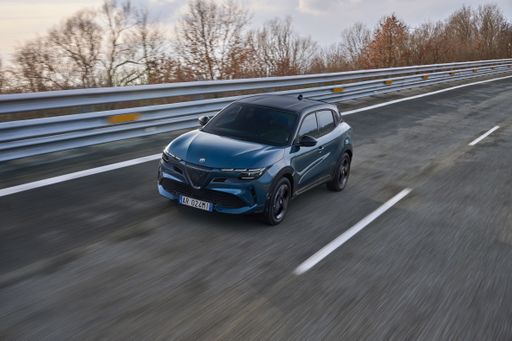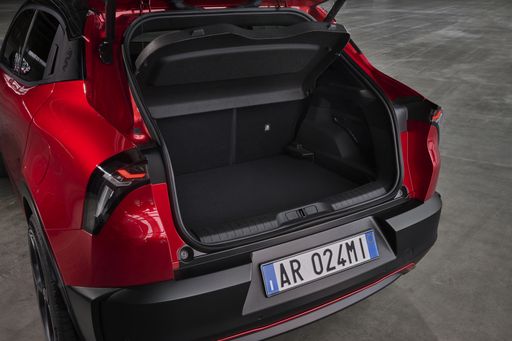Alfa Romeo Junior vs Citroen Jumpy Bus – Which model is better for everyday use?
Both models have their strengths – but which one suits you more?
Compare performance, efficiency, price and space directly: Alfa Romeo Junior or Citroen Jumpy Bus?
Costs and Efficiency:
Price and efficiency are often the first things buyers look at. Here it becomes clear which model has the long-term edge – whether at the pump, the plug, or in purchase price.
Alfa Romeo Junior has a clearly advantage in terms of price – it starts at 25700 £, while the Citroen Jumpy Bus costs 37900 £. That’s a price difference of around 12240 £.
In terms of energy consumption, the advantage goes to the Alfa Romeo Junior: with 15.10 kWh per 100 km, it’s decisively more efficient than the Citroen Jumpy Bus with 24.10 kWh. That’s a difference of about 9 kWh.
As for range, the Alfa Romeo Junior performs a bit better – achieving up to 410 km, about 58 km more than the Citroen Jumpy Bus.
Engine and Performance:
Under the bonnet, it becomes clear which model is tuned for sportiness and which one takes the lead when you hit the accelerator.
When it comes to engine power, the Alfa Romeo Junior has a convincingly edge – offering 280 HP compared to 136 HP. That’s roughly 144 HP more horsepower.
In terms of top speed, the Alfa Romeo Junior performs distinct better – reaching 206 km/h, while the Citroen Jumpy Bus tops out at 130 km/h. The difference is around 76 km/h.
There’s also a difference in torque: Alfa Romeo Junior pulls evident stronger with 345 Nm compared to 260 Nm. That’s about 85 Nm difference.
Space and Everyday Use:
Cabin size, boot volume and payload all play a role in everyday practicality. Here, comfort and flexibility make the difference.
Seats: Citroen Jumpy Bus offers significantly more seating capacity – 9 vs 5.
In curb weight, Alfa Romeo Junior is decisively lighter – 1380 kg compared to 2018 kg. The difference is around 638 kg.
In terms of boot space, the Citroen Jumpy Bus offers decisively more room – 3497 L compared to 415 L. That’s a difference of about 3082 L.
In maximum load capacity, the Citroen Jumpy Bus performs clearly better – up to 4554 L, which is about 3274 L more than the Alfa Romeo Junior.
When it comes to payload, Citroen Jumpy Bus convincingly takes the win – 982 kg compared to 420 kg. That’s a difference of about 562 kg.
Who comes out on top?
Overall, the Alfa Romeo Junior shows itself to be is largely superior and secures the title of DriveDuel Champion.
It convinces with the more balanced overall package and proves to be the more versatile choice for everyday use.
 @ Alfa Romeo / Stellantis Media
@ Alfa Romeo / Stellantis Media
Alfa Romeo Junior
Alfa Romeo Junior
The Alfa Romeo Junior captures the essence of Italian design with its sleek lines and compact dimensions, making it an icon of elegance and performance. With a spirited driving experience and a charming retro aesthetic, it appeals to enthusiasts and casual drivers alike. This delightful car embodies the brand's rich heritage while remaining a fun and engaging option for those seeking a unique automotive experience.
details @ Alfa Romeo / Stellantis Media
@ Alfa Romeo / Stellantis Media
 @ Alfa Romeo / Stellantis Media
@ Alfa Romeo / Stellantis Media
 @ Alfa Romeo / Stellantis Media
@ Alfa Romeo / Stellantis Media
Citroen Jumpy Bus
The Citroen Jumpy Bus offers a versatile and spacious interior, making it ideal for both family outings and professional use. Its sleek design is complemented by practical features, ensuring a comfortable and efficient driving experience. With an emphasis on adaptability, this model caters well to a variety of transportation needs, seamlessly blending functionality with style.
details
 @ Alfa Romeo / Stellantis Media
@ Alfa Romeo / Stellantis Media
|
|
|
|
|
Costs and Consumption |
|
|---|---|
|
Price
25700 - 41600 £
|
Price
37900 - 43900 £
|
|
Consumption L/100km
4.8 - 5.4 L
|
Consumption L/100km
-
|
|
Consumption kWh/100km
15.1 - 17.5 kWh
|
Consumption kWh/100km
24.1 - 24.4 kWh
|
|
Electric Range
344 - 410 km
|
Electric Range
221 - 352 km
|
|
Battery Capacity
0.4 - 51 kWh
|
Battery Capacity
-
|
|
co2
0 - 119 g/km
|
co2
0 g/km
|
|
Fuel tank capacity
44 - 45 L
|
Fuel tank capacity
-
|
Dimensions and Body |
|
|---|---|
|
Body Type
SUV
|
Body Type
Bus
|
|
Seats
5
|
Seats
9
|
|
Doors
5
|
Doors
4
|
|
Curb weight
1380 - 1689 kg
|
Curb weight
2018 - 2240 kg
|
|
Trunk capacity
340 - 415 L
|
Trunk capacity
3061 - 3497 L
|
|
Length
4173 mm
|
Length
4983 - 5333 mm
|
|
Width
1781 mm
|
Width
1920 mm
|
|
Height
1505 - 1538 mm
|
Height
1895 - 1935 mm
|
|
Max trunk capacity
1205 - 1280 L
|
Max trunk capacity
3968 - 4554 L
|
|
Payload
390 - 420 kg
|
Payload
850 - 982 kg
|
Engine and Performance |
|
|---|---|
|
Engine Type
Electric, Petrol MHEV
|
Engine Type
Electric
|
|
Transmission
Automatic
|
Transmission
Automatic
|
|
Transmission Detail
Dual-Clutch Automatic, Reduction Gearbox
|
Transmission Detail
Reduction Gearbox
|
|
Drive Type
Front-Wheel Drive, All-Wheel Drive
|
Drive Type
Front-Wheel Drive
|
|
Power HP
136 - 280 HP
|
Power HP
136 HP
|
|
Acceleration 0-100km/h
5.9 - 9.1 s
|
Acceleration 0-100km/h
-
|
|
Max Speed
150 - 206 km/h
|
Max Speed
130 km/h
|
|
Torque
230 - 345 Nm
|
Torque
260 Nm
|
|
Number of Cylinders
3
|
Number of Cylinders
-
|
|
Power kW
100 - 207 kW
|
Power kW
100 kW
|
|
Engine capacity
1199 cm3
|
Engine capacity
-
|
General |
|
|---|---|
|
Model Year
2024 - 2025
|
Model Year
2024
|
|
CO2 Efficiency Class
A, C, D
|
CO2 Efficiency Class
A
|
|
Brand
Alfa Romeo
|
Brand
Citroen
|
What drive types are available for the Alfa Romeo Junior?
Available configurations include Front-Wheel Drive or All-Wheel Drive.
The prices and data displayed are estimates based on German list prices and may vary by country. This information is not legally binding.
